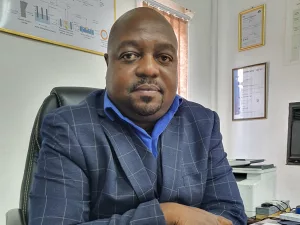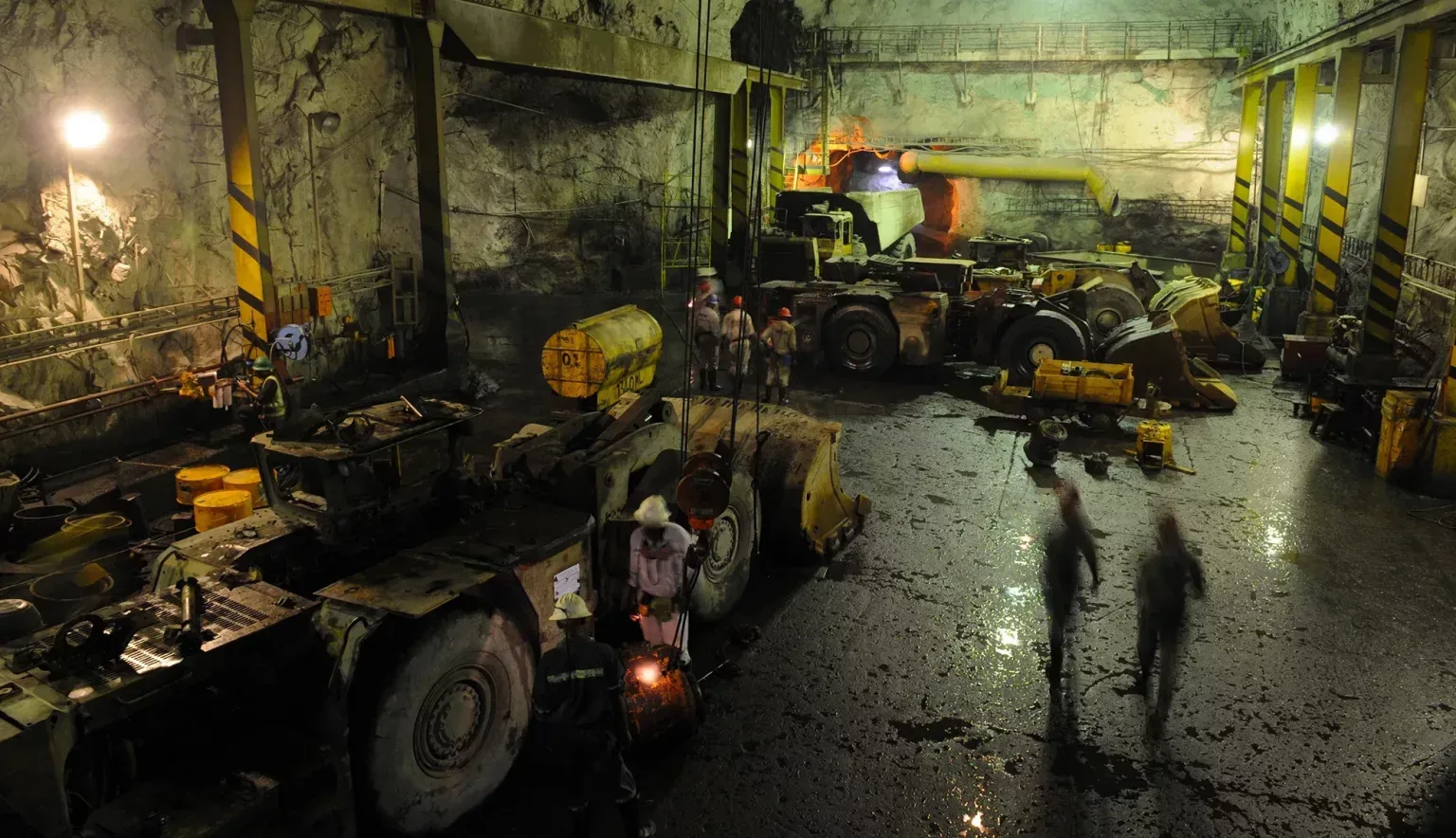MOPANI COPPER MINES: PROUDLY ZAMBIAN
Due to the inseparable socio-economic context of mining within the national industrial landscape, the rejuvenation and reinvention of MCM is a microcosm of the prosperity that the organisation wishes to drive across Zambia itself.
Indeed, as MCM grows, so too will its native country.
“We want to show that Zambians are capable of running their own mines, safely, cost-effectively, and profitably.”
This returns to the benefit of “cutting out the bureaucracy”, that Sakanya considers a true advantage in the re-modelling of the mine’s ownership structure.
The company has subsequently undergone a transformation that has MCM’s status as a proudly Zambian enterprise firmly at the core. For Sakanya, this national pride has always existed at MCM, but was never fully brought to the fore.
“The Mopani brand has a long-standing Zambian heritage. We will maintain MCM’s legacy, but this time around the Zambians themselves who want to compete on the world stage,” he states.
Whilst maintaining an aspirational view of future prospects, Sakanya is alert to the advantage that an organisation such as MCM already holds and will use this as the fulcrum to propel the company forwards.
“We already have a well-established market and the MCM brand continues to sell at a premium. MCM must therefore take advantage of this competitiveness in the sector to produce more.”
With the mine’s ownership now wholly in the hands of ZCCM-IH, a suitable rebranding ensued with the image of the robust Mopani tree at the fore.
“Our logo, letterheads, and safe-mining posters all speak of our new identity. MCM is currently the only mining company in Zambia wholly owned by Zambians.
“We would like to operate this asset and benchmark it to national players,” Sakanya comments.

Once all these projects are completed within the next two to three years, MCM will produce eight to 10 million tonnes of ore per year – almost double its current capacity
Charles Sakanya, CEO, MCMMCM: AN EMPLOYER OF CHOICE
“A successful MCM will create more jobs,” Sakanya believes. But of course, in order to truly attract and retain talent, a focus is needed on how MCM models itself as an employer.
“We want to make MCM the employer of choice – safe, stable, and profitable,” he adds.
For Sakanya, this begins with forging trust by fostering inter-personal relationships amongst staff members. All MCM employees are made to feel seen and empowered through rewards for performance and the regular recognition of achievements.
“We show them how they contribute to the supply chain and ensure they are involved in making the decisions that affect their work.”
MCM practices an open-door policy, whereby employee suggestions are analysed and implemented to contribute to safety, asset management, and production increase.
As a proudly national enterprise, currently only 0.45 percent of MCM’s 5,545 direct employees are expatriates. In addition to this workforce, MCM has 6,630 contractor employees in various areas of the operation.
As a responsible corporate citizen intrinsically involved in sustainable local development, the role of MCM’s Corporate Affairs and CSR Manager, Lorraine Tembo, is paramount as the interface between company and community.
Adjacent to this, Tembo fulfils a key position in MCM’s aspirations as an employer of choice, empowering employees and encouraging talent retention by ensuring that the available human resources policies for staff management are both practical and implementable, as evidenced by the policies outlined above.
Echoing the treatment of its workforce, Mopani Copper Mines is proud of the significant part that it plays in the livelihoods of the communities surrounding the company’s operations and endeavours to build resilience through various initiatives.
“The main purpose of my role is to manage the company’s corporate image building activities, corporate events, community support programmes, social assets, and devising mechanisms of recording, resolving and managing community and stakeholder grievances,” opens Tembo.
“In order to do this effectively, the Corporate Affairs department maintains an elaborate stakeholder register to ensure we have captured all relevant stakeholders that have an interest in our mining operations,” she continues.
A RESPONSIBLE CORPORATE CITIZEN
MCM’s numerous CSR and community initiatives encompass the company’s status as a socially conscious corporate citizen, that is fully cognisant of the beneficial role that it can perform. Indeed, since inception, MCM has invested over $200 million in various community projects dedicated to improving the living standards of local people.
By so doing, MCM hopes to enable its host communities to identify and address their own issues and opportunities to reduce dependence on the mine, using every chance to communicate on matters of mutual benefit consistently and in a timely manner to increase the awareness of services, operations and opportunities.
“We would like to motivate behaviour and attitude change, especially in young people, whilst also educating community stakeholders on matters of mutual interest and involving them in decision making,” states Tembo.
These investments in the local society extend from infrastructural development to water and sanitation, education, health, sports, and entrepreneurship development.
Complementary to this, MCM conducts ad hoc donations subject to varying community needs, whilst also supporting charitable organisations with their day-to-day operations.
“Through this good relationship, the communities tend to appreciate the company’s initiatives to contribute to overall poverty reduction, access to health and education, infrastructure and local business participation in the mining supply chain.”
From a corporate perspective, this translates to making MCM an attractive stakeholder prospect, maintaining an up-to-date and in-depth understanding of the company strategy whereby all stakeholders are provided with the most relevant information.
“Societal expectations of the mining industry encompass a broad range of environmental, social and governance challenges,” Tembo comments.
“For this reason, my role ensures the company has an effective communication plan that identifies the strategies and actions required to promote the productive involvement of stakeholders in decision-making and execution, ultimately ensuring that MCM maintains its social licence to operate (SLTO),” she concludes.
PRIORITISING EDUCATION
Turning to talk of concrete examples of MCM’s societal involvement, Tembo foregrounds MCM’s critical role in local education, benefitting not just the community, but also the company itself.
“Training and development programmes provide a host of benefits to MCM as a company,” she tells us.
Sakanya himself is also fully cognisant to the immense benefits of education, after initially studying Mechanical Engineering and Management, before being sponsored to travel to the UK and undertake an Engineering Management BEng at Liverpool University by ZCCM Limited.
“Mopani Copper Mines has two primary schools, one in Kitwe and the other in Mufulira. We also run two secondary schools in those same towns.
“The pass mark in our schools is a 100 percent success rate,” Sakanya tells us proudly.
The four schools offer quality education to young people between the ages of five to 17 years.
“The schools also offer subsidised school fees for the children of MCM employees. Both are fully recognised by the Ministry of General Education and operate under the standards set by the Ministry,” Tembo inform us.
Complementary to these local institutions, Mopani Copper Mines also operates a training centre located in Mufulira. According to Sakanya, the Mufulira Training Centre (MCTC), is a state-of-the-art school that was a $21 million project for MCM. The MCTC offers comprehensive training in technical courses such as fitting, electrical rigging, metal fabrication, instrumentation, metallurgical courses, and safety induction courses. The school is fully accredited by TEVETA as a government board at national level.
The centre plays a pivotal role in enhancing employee performance through continuous upskilling in areas where they might be lacking.
“This helps boost employee productivity and reduce employee turnover. Training builds confidence in our employees, knowing that they are fully trained in the jobs that they are required to perform,” Tembo adds.
In order to ensure that only competent staff are employed on the premises, all new MCM employees and contractor staff are required to undergo skill tests to ascertain their level of competence before they are permitted to work on site. This is a crucial factor in minimising accidents in a high-risk environment.
“All graduate engineers within mining, metallurgy, and engineering are placed on a development programme for 24 months to develop them into quality engineers, as per the MCM standard,” she continues.
Through these rigorous training programmes, MCM is able to effectively identify the skills gap by using the employee training matrix, and subsequently conducting the training to close that gap.

We contribute to ‘Making Mopani Great Again’ by ensuring good relationships between Mopani Copper Mines and our host communities.
Lorraine Tembo, Manager Corporate Affairs and CSR, Mopani Copper Mines































